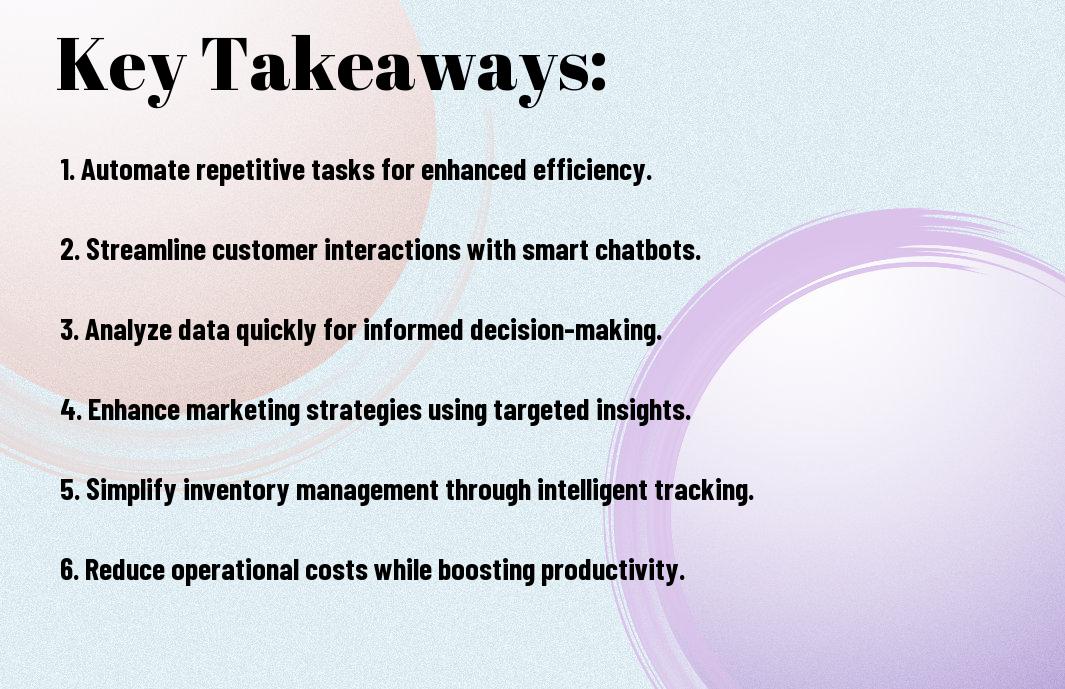Understanding AI Agents
A growing number of small businesses are turning to AI agents to streamline their operations and enhance productivity. These digital assistants leverage artificial intelligence to automate repetitive tasks, analyze data, and facilitate better communication within your team. By incorporating AI agents into your daily workflow, you can increase efficiency, reduce errors, and focus on more strategic activities that drive growth.
Definition and Functionality
Understanding AI agents begins with recognizing their purpose and capabilities. AI agents are intelligent software programs designed to perform specific functions through natural language processing, machine learning, and data analysis. They offer a powerful solution for automating tasks, enhancing decision-making, and providing valuable insights that can improve your business operations.
Types of AI Agents
Around the world, various types of AI agents cater to different business needs and preferences. Here’s a breakdown of key types:
- Chatbots: Designed for customer interaction and support.
- Virtual Assistants: Manage schedules, emails, and reminders.
- Predictive Analysis Agents: Analyze data trends to forecast outcomes.
- Process Automation Agents: Execute repetitive tasks across platforms.
- Recommendation Systems: Suggest products and services based on user behavior.
| Type of AI Agent | Description |
|---|---|
| Chatbots | Interact with customers in real-time through conversation. |
| Virtual Assistants | Help manage your time by organizing tasks and information. |
| Predictive Analysis Agents | Identify patterns in data for more informed decision-making. |
| Process Automation Agents | Perform repetitive actions to free up your time. |
| Recommendation Systems | Enhance customer experience through personalized suggestions. |
Functionality of AI Agents goes beyond basic task execution. They are equipped with machine learning algorithms that allow them to improve over time by learning from previous interactions. For small businesses, this means not just task automation, but also enhanced customer engagement and operational insights. This results in smoother processes and improved decision-making capacity.
- Machine Learning-based Agents: Continuously improve accuracy in tasks.
- Decision Support Agents: Aid in strategic business decision making.
- Sentiment Analysis Agents: Gauge customer feedback and satisfaction.
- Inventory Management Agents: Optimize stock levels and reduce costs.
- Integration Agents: Connect various software and tools seamlessly.
| Functionality Type | Purpose |
|---|---|
| Learning Algorithms | Enhance performance over time through experience. |
| Customer Engagement | Provide timely responses that boost customer relations. |
| Operational Insights | Generate reports for informed business strategies. |
| Cost Reduction | Minimize manual labor and associated errors. |
| Seamless Integration | Combine various software solutions for efficiency. |
Thou are empowered by implementing AI agents, driving your business toward innovation and efficiency.
Benefits of AI Agents for Small Businesses
There’s no denying that AI agents can revolutionize the way you manage your small business. By streamlining tasks, enhancing customer service, and providing valuable insights, AI empowers you to focus on core activities and strategic growth. From automating mundane processes to personalizing customer experiences, the benefits of integrating AI into your daily operations are significant, allowing your business to thrive in a competitive landscape.
Increased Efficiency
Around 40% of employees report that routine tasks take up a significant part of their workday. AI agents can handle these repetitive tasks, freeing up your time to focus on more strategic initiatives. With automation at your disposal, you can optimize workflows, reduce errors, and improve overall productivity, ultimately leading to a more efficient business operation.
Cost Savings
Efficiency in your operations often translates to significant cost savings. By leveraging AI to automate processes, you can reduce labor costs and minimize human errors. This efficiency allows you to allocate resources more effectively, leading to savings that you can reinvest back into your business.
It’s not just about reducing costs; implementing AI solutions can result in enhanced decision-making and better resource management. As AI analyzes data and provides actionable insights, you’ll identify areas to cut unnecessary spending or streamline processes. The cumulative effect of these savings can significantly boost your bottom line while allowing you to improve services or invest in growth opportunities.
Implementing AI Agents in Daily Operations
Unlike traditional methods, implementing AI agents in your daily operations can streamline processes and enhance efficiency. By automating repetitive tasks such as customer inquiries or inventory management, you’ll free up valuable time for you and your team to focus on strategic initiatives. Embracing an AI-driven approach not only improves productivity but also positions your business to better meet customer expectations in an increasingly competitive landscape.
Selecting the Right AI Solution
Daily consideration of your business’s specific needs is imperative when selecting the right AI solution. Explore various options that cater to your unique workflows and identify tools that can seamlessly integrate into your operations. Whether it’s chatbots, data analytics, or process automation, ensuring your chosen AI technology aligns with your objectives will be key to successful implementation.
Integration with Existing Systems
Behind every successful AI implementation lies the ability to effectively integrate with your existing systems to ensure smooth transitions. An AI agent that works harmoniously with your current tools, such as CRM or inventory management software, can significantly minimize disruption and maximize benefits.
Consequently, integrating AI agents with your existing systems requires careful planning and execution. Evaluate how data flows through your organization and identify touchpoints where AI can enhance functionality. Partnerships with technology providers can facilitate a seamless integration process, ensuring that your AI agent complements your workflows rather than complicating them. Testing and iterative adjustments during this phase will help you optimize the overall performance and leverage the full potential of AI in your operations.
Case Studies: Success Stories of AI in Small Businesses
Your understanding of AI’s impact can be enriched by exploring these success stories from small businesses that have integrated AI into their daily operations:
- Clothing Retailer: Increased sales by 30% after implementing AI-driven personalized marketing targeted at customer segments.
- Coffee Shop: Reduced inventory costs by 20% through AI tools that optimized supply chain management.
- Fitness Studio: Enhanced customer retention rates by 25% utilizing automated follow-up and personalized class recommendations.
- Online Boutique: Improved customer service response time by 50% with AI chatbots addressing queries after hours.
Retail Sector
Retail businesses leverage AI technology to enhance customer experience and streamline operations. By utilizing AI algorithms for personalized recommendations, your retail establishment can engage customers more effectively, leading to increased consumer loyalty and higher sales conversions.
Service Industry
Around the service sector, AI is making strides by automating tasks that typically consume significant time and effort. By incorporating AI tools, you can efficiently schedule appointments, manage client communications, and analyze feedback, which ultimately improves service quality.
For instance, a local salon experienced a 40% increase in appointment bookings after implementing an AI-based scheduling system. This system not only reduced scheduling conflicts but also allowed for personalized reminders, which decreased no-show rates by 15%. By integrating AI, your service business can significantly improve operational efficiency and enhance the overall client experience, fostering growth and long-term success.
Overcoming Challenges in AI Adoption
Once again, the journey towards adopting AI agents in your small business may be fraught with challenges. You might face resistance from employees, concerns about data security, or uncertainty on what technology to implement. However, understanding these obstacles is the first step toward establishing a successful AI strategy that can enhance your daily operations and streamline your workflows.
Common Misconceptions
About AI adoption, many small business owners believe that it is only suitable for large enterprises with extensive budgets. This misconception can hinder your ability to explore innovative solutions that could benefit your operations. In reality, AI tools are increasingly accessible and scalable, making them ideal for businesses of all sizes.
Addressing Technical Barriers
Among the various challenges you might encounter during AI adoption are technical barriers, including insufficient technical knowledge and integration issues with existing systems. These barriers can create frustration and may delay your implementation process, but addressing them is vital for achieving successful outcomes.
With the right approach and resources, you can effectively overcome technical barriers. Consider seeking partnerships with tech experts who can assist you in understanding AI tools and how to integrate them into your existing infrastructure. Additionally, investing in employee training will empower your team with the knowledge to utilize these tools efficiently, enhancing overall productivity and boosting confidence in AI technologies.
Future Trends in AI for Small Businesses
All small businesses can benefit from the evolving landscape of AI technologies. As these tools become more accessible, they offer innovative solutions to streamline operations, enhance customer interactions, and maximize efficiency. By staying informed about these trends, you can strategically adopt AI tools that align with your business goals and ensure you remain competitive in your industry.
Emerging Technologies
Between advancements in natural language processing and machine learning algorithms, emerging technologies are rapidly transforming how small businesses operate. These innovations enable you to automate repetitive tasks, analyze customer data more efficiently, and personalize marketing efforts, giving you a distinct advantage in a crowded marketplace.
Predictions for Adoption Rates
Across various sectors, the adoption rates of AI technologies are expected to soar as small businesses recognize their potential for driving growth. With increased awareness and greater availability of user-friendly solutions, more entrepreneurs are likely to incorporate AI into their daily operations.
Hence, as AI becomes more integrated into business processes, you may see a significant uptick in adoption rates among small businesses. Industry experts project that by 2025, a substantial percentage of small enterprises will utilize AI tools, highlighting the importance of staying ahead of the curve. Embracing these technologies not only drives efficiency but also allows you to provide better services to your customers, ensuring sustained growth in an ever-evolving digital landscape.
Final Words
Taking this into account, integrating AI agents into your small business operations can significantly enhance efficiency and productivity. By automating routine tasks and providing insightful analytics, these intelligent tools enable you to focus on what truly matters—growing your business. Embracing this technology not only streamlines your daily processes but also empowers you to make informed decisions that can lead to greater success. Invest in AI agents today, and watch your business transform with ease and effectiveness.
Q: How can AI agents streamline daily operations for small businesses?
A: AI agents can significantly enhance the efficiency of daily operations for small businesses by automating repetitive tasks such as customer support, scheduling, and data entry. They can analyze customer inquiries and provide instant responses, thereby improving response times and freeing up human resources for more complex tasks. Additionally, AI agents can assist in inventory management by tracking stock levels and predicting future needs based on sales trends, which helps businesses to reduce waste and optimize supply chain processes.
Q: What are some examples of AI agents that can be used by small businesses?
A: There are numerous AI agents available that cater specifically to small businesses. For instance, chatbots like Drift or Intercom can handle customer queries on websites, while platforms like Zapier can automate workflows between different applications. Virtual assistants such as Google Assistant or Microsoft Cortana can help manage schedules and reminders. AI-driven tools for marketing, like HubSpot, analyze consumer behavior to personalize outreach efforts, enhancing customer engagement. These tools collectively work to reduce operational burdens and improve customer experiences.
Q: What factors should small businesses consider before implementing AI agents?
A: Before integrating AI agents, small businesses should evaluate their specific needs and identify areas where automation can provide the most benefit. It’s necessary to consider the cost of implementation and ongoing maintenance, as well as the potential return on investment. Additionally, businesses should assess their team’s readiness for this technology by ensuring that employees are trained to work alongside AI systems. Evaluating the scalability of the chosen AI solutions is also important, as businesses may need different functionalities as they grow. Consulting with technology experts can provide valuable insights during this transition.



